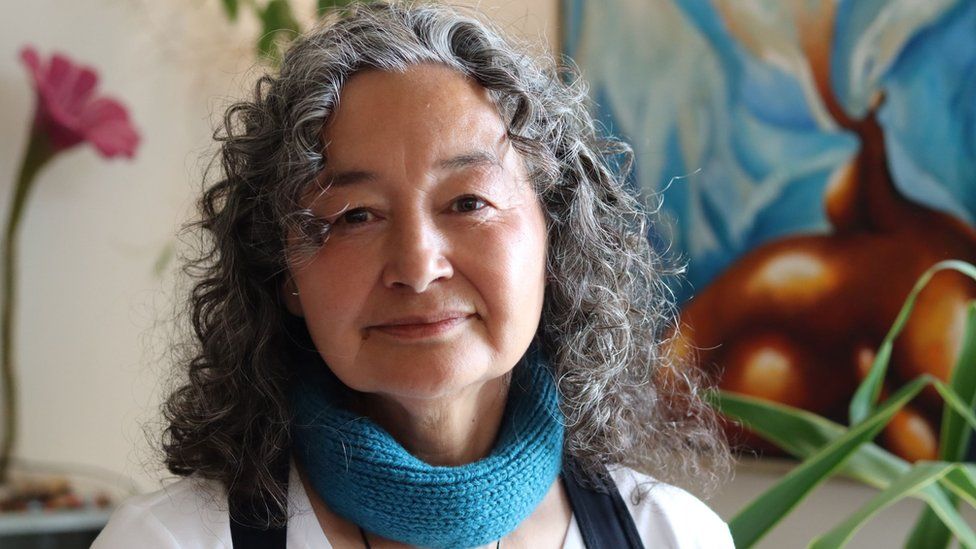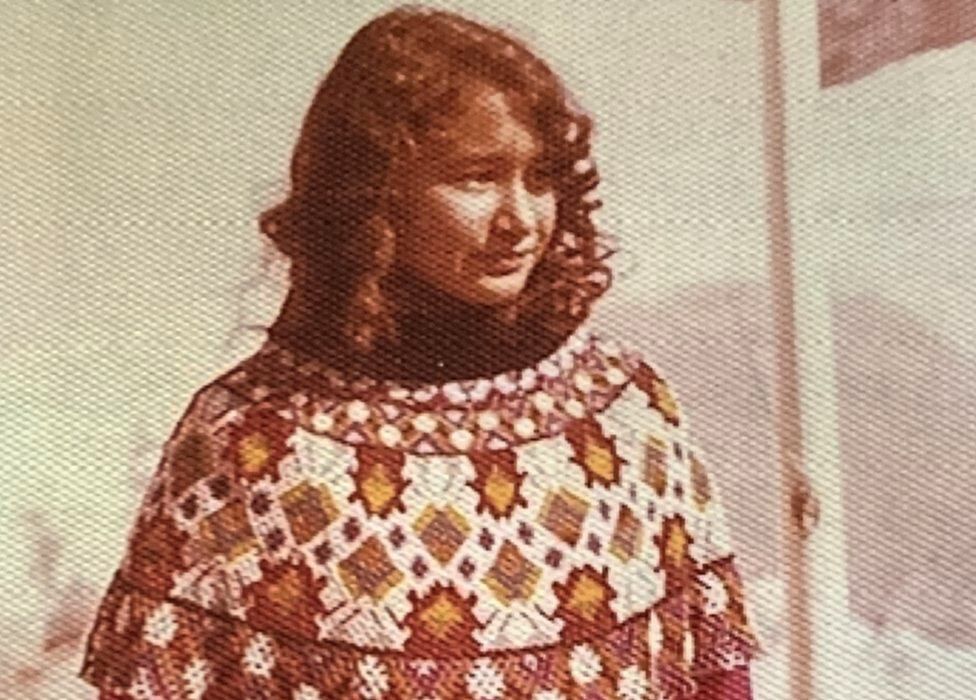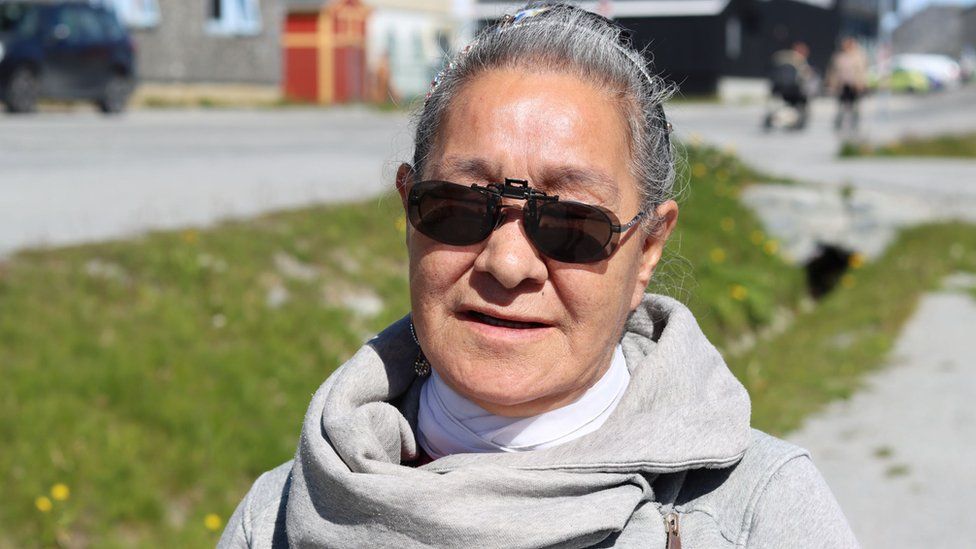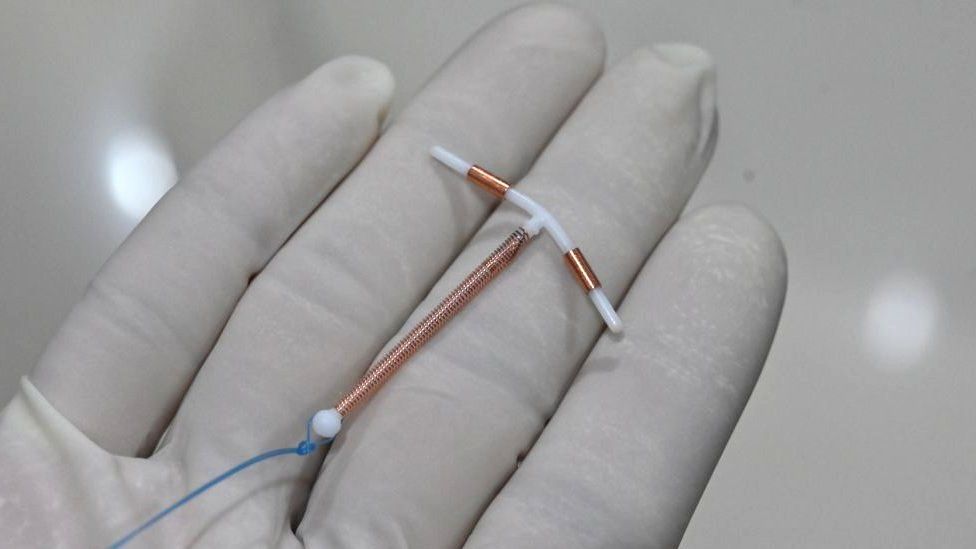
Denmark and Greenland have formally agreed to launch a two-year investigation into historic birth control practices carried out for many years on Inuit Greenlanders by Danish doctors.
Thousands of Inuit women and girls were fitted with an intrauterine device (IUD), commonly known as a coil, during the 1960s and 70s.
It is a contraceptive device placed inside the womb - or uterus - to prevent pregnancy.
Among the women and girls fitted with an IUD was Naja Lyberth.
It was in the 1970s that a doctor told Naja, who believes she was then aged about 13, to go to her local hospital to have a coil implanted following a routine school medical examination.
"I didn't really know what it [was] because he never explained or got my permission," says Naja, who at the time was living in Maniitsoq, a small town on Greenland's west coast.
"I was afraid. I couldn't tell my parents," she says. "I was a virgin. I had never even kissed a boy."
Now 60, Naja is one of the first to speak out about what happened.
"I can remember the doctors [in] white coats, and maybe there was a nurse. I saw the metal things [stirrups] where you should spread your legs. It was very frightening. The equipment the doctors used was so big for my child body - it was like having knives inside me."
 IMAGE SOURCE,NAJA LYBERTH
IMAGE SOURCE,NAJA LYBERTHNaja says her parents' permission had not been sought, and that her classmates were also sent to hospital but did not talk about it because "it was too shocking".
She has set up a Facebook group to allow women to share their common experiences and help each other cope with the trauma. More than 70 women have joined.
A recent podcast, Spiralkampagnen ("coil campaign"), found records indicating that up to 4,500 women and girls - roughly half of all fertile females - had an IUD implanted in Greenland between 1966 and 1970. But the procedures continued into the mid-1970s.
Of these, it is unclear how many cases lacked consent or proper explanation.
Among those affected were girls as young as 12, and several have stated publicly that they were not properly informed. Some women unable to have children suspect the coil is to blame.
"So many women contact me," says Naja. "It seems that the younger the girls were, the more complications they get from this coil. It's so sad."
Arnannguaq Poulsen had a coil fitted when she was 16, not in Greenland but on Danish soil. She was studying at a boarding school for Greenlandic children on the island of Bornholm in 1974.

"They didn't ask me before the procedure, and I had no idea what it was all about, or what the coil was," she says.
She could only travel home once a year and is certain her parents were not consulted. Arnannguaq describes suffering pains, and says she had the coil removed when she returned home to Greenland a year later, aged 17.
"I feel that I didn't get a choice back then, and I cannot accept that," the 64-year-old says, tearfully. "How would people react if it was Danish women instead of Greenlandic?"
There was little knowledge of the birth control programme in either Greenland or Denmark, and the reports have caused shock and indignation.
Now, a committee will examine the pregnancy prevention practices carried out by Danish health authorities between 1960 and 1991, both in Greenland and at schools in Denmark with Greenlandic students.
Greenland's government only took control of health policy from Copenhagen in 1992.
In a statement on Friday, Danish Health Minister Magnus Heunicke said the investigation would shed light on the decisions leading up to the practice, and how it was carried out.
He said he had met several of the women affected, adding: "The pain, physically and emotionally, that they have experienced is still there today."
Greenland transitioned from a colony to a country of Denmark in 1953.
Sweeping modernisation plans ushered in better healthcare and living conditions. Life expectancy and new-born survival rates improved.
But those successes brought other challenges, says Soeren Rud, a historian at Copenhagen University.
Greenland's tiny population rocketed, and by 1970 it had almost doubled.
 IMAGE SOURCE,GETTY IMAGES
IMAGE SOURCE,GETTY IMAGESMr Rud believes the rationale for introducing the coil was partly financial, but also the result of colonial attitudes.
"There's an obvious interest in trying to limit the growth of the population," he says, adding that it reduces "the challenges of providing housing and welfare services".
A high proportion of young single mothers was another concern that prompted family-planning initiatives.
Doctors wrote about the coil initiative in journals, perceiving it a success, Mr Rud adds. Records show the birth rate halved in just a few years.
Katrine Jakobsen, from Nuuk, says she was only 12 when she had a coil fitted. She remembers being taken to the doctor by a relative's girlfriend in 1974.
She had the coil for almost two decades and suffered pain and a string of complications. In her late 30s, her uterus was removed.
I remember right after the procedure, I was in so much pain that I just sat down in the snow.

"It's had a big impact on my life. I never had children," she says. "I never told anyone. I always thought I was alone in this."
Today's IUDs are small T-like devices, but earlier versions in the 1960s were S-shaped and much larger.
"In a uterus that had never been pregnant, it would give more bleeding, more pain, a bigger risk of infection," says Dr Aviaja Siegstad, a gynaecologist at Queen Ingrid's Hospital in Nuuk.
In the 1990s and 2000s, she and her colleagues came across patients struggling to conceive who were unaware they had a coil. It was not a big number, she says, but it was also not unusual.
"In a couple of cases we were able to date the IUD back to women who had abortions and probably had it placed after an abortion without being told," she adds.
According to Greenland's Human Rights Council, conventions on family life and privacy were breached.
"We need to get it investigated to know whether or not it was actually a genocide," says the council's chairperson Qivioq Loevstroem, adding: "We don't want a whitewashed report."
Greenland's health minister, Mimi Karlsen, said involving Greenland in the investigation was "necessary to get to the bottom" of what happened.
It follows other controversies that have seen Denmark's past relationship with Greenland come under increased scrutiny.
In March, Denmark apologised and paid compensation to six Inuit who were separated from their families and sent to Denmark as part of failed 1950s social experiment.
During the summer, Greenland's parliament voted for a separate commission to examine Denmark's decolonisation after 1953.
Counselling has been offered to those affected by the birth control practice, but Arnannguaq Poulsen hopes there will be compensation.
"I know there are many women that cannot have children," she says.
https://www.bbc.com/news/world-europe-63049387
© 2022 BBC. The BBC is not responsible for the content of external sites.





0 Comments:
Post a Comment